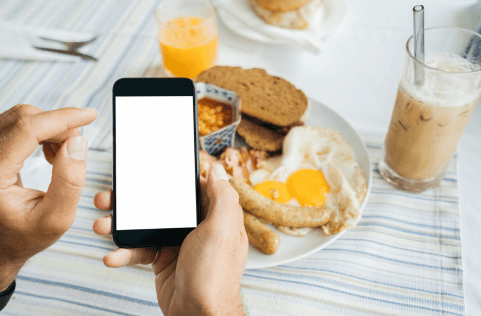Raise your hand if you’ve ever felt so consumed with calorie counting that you start to no longer see food for food, but as instead a number - calories, macros, points, etc. Instead of choosing foods because you love them or because you know they are going to taste good and be satisfying, you choose them because the “number” is appealing or maybe the calories in that food item are so low that you feel that the food item is “better” suited for your diet.
Maybe you’ve even felt fearful of consuming that food after seeing the number of calories - a fear that you wouldn’t have even had if you hadn’t seen the number in the first place. Have you ever stopped reading about the actual food items on a restaurant board or on a menu because your eyes are darting to the number of calories instead? You open up the menu and instantly you are consumed with the number of calories instead of focusing on the beautiful descriptions of the food items themselves? yup, guilty as charged.
If you’re feeling consumed by calories, here’s the good news: with the right amount of support and guidance (like through our Jumpstart to Intuitive Eating Course) you can challenge your brain to shift away from the calorie counting stronghold, freeing up space to focus on about a million other things 😉
Ready to start? Let’s dive in...

4 reasons calorie counting does more harm than good
1. You're left feeling guilty, self-critical obsessive and anxious
Calorie counting often becomes a source of stress, a foundation for food rules, and restriction. Studies on dieting also indicate that restricting intake by tracking calories can increase psychological stress on an individual and can increase cortisol levels which impact the biological functioning of the body. NOT an ideal situation!
If you find yourself feeling anxious or depressed as a result of tracking your calories, worried about every morsel of food that touches your lips. Recognize these warning signs and reroute your path.
2. you are ignoring body cues
“I ate lunch and then a few minutes later I was still hungry, so I drank a glass of water which helped for a little. But then I still felt hungry so I went for a walk until it passed.”
What if we ignored other body cues? “I’m feeling cold…. but I shouldn’t because the thermostat says 68 so that should be warm enough. I’ll just watch tv until I forget about being cold.” Or “Wow, I’m really tired but it’s only 8 pm and I usually go to bed at 10 pm… I’ll just find something to do until it’s actually time for bed.” Or, my personal favorite, “I really have to pee, but maybe I’ll just call a friend instead and hope that feeling goes away.”
HELLO! Our bodies are made to signal to our brains what we NEED. If you’re cold, grab another layer, if you’re hot, change into something cooler, if you’re tired, get some rest, if you have to pee, pee and if you’re hungry, EAT!
When we count calories we are using an EXTERNAL cue (usually driven by dieting/diet culture) to guide our eating rather than our natural, INTERNAL cues which help us eat intuitively. External cues I often hear from clients include counting and tracking calories, counting macros (grams of fat/carbs/sugar), portion sizes, dietary guidelines, and the clock. Sure some of this external information can help us learn about nutrition, what a balanced meal or plate may look like, what foods are made up of, and when it might be time for a meal or snack. Nonetheless, using external guidelines can also lead to a plethora of negative consequences, including increasing stress around food intake.
The majority of us have been intuitive eaters in the past. Let’s think about the most intuitive eaters: babies. Babies cry when they’re hungry, quiet down when they’re given food, and stop eating when they’re full. Toddlers often do the same, they become upset when hungry, content when given food, and will stop eating when they’ve had enough.
Internal cues including hunger, fullness, cravings, food preferences, flavors, textures, colors, and smells start at an early age. If we allow children exposure to ALL foods, we’ll naturally crave a variety. We will crave pizza, cookies, ice cream, and chips. We will also crave fruits, vegetables, protein, and grains. We learn to have a balance of all foods and our bodies will know exactly what they need and how to utilize the nutrition within these foods.
Somewhere along the way, we shift away from these internal cues and start to challenge them, but what if we continued listening?
When we stop focusing on internal cues and start using external cues to regulate our intake, we aren’t tuning in to what we really need or want to each which varies day to day. We become more anxious around food and social food events. Often times, we steer away from the foods we ENJOY by using external guidelines. We skip out on cookies that look or smell good, we don’t allow ourselves that extra snack or second portion even if we are hungry. We eat before the party because we “can’t be tempted” by the cake (we like). Re-learning to follow internal cues can be difficult, but it can ultimately lead to a more balanced diet and a happier and healthier relationship with food and your body. A win/win if you ask me!
Does this interest you? Our Jumpstart to Intuitive Eating Course helps to lay the foundation to a more peaceful relationship with food.
3. You worry that eating any more than your "calorie limit" will lead to weight gain
“If I eat more today than yesterday, I will gain weight!” Another common fear and barrier to intuitive eating that I often hear from my clients.
Weight fluctuations are NORMAL my friends! You may weigh a few pounds more or less, day to day depending on many factors other than what you eat (ie. fluids, hormones, stress, sleep). Your body is constantly seeking balance and will fight hard for stability, some days needing more and others less. Your body is made to regulate temperature, eating, fluids, and weight!
By limiting your intake to a certain number of calories every day, your body is unable to naturally regulate itself. Some days you need MORE than X amount of calories and some days you might need LESS. Varying intake is NORMAL. Your body knows when it needs more. Counting calories (or macros, or anything else) drowns out that innate wisdom and replaces it with worry.
Do you find yourself avoiding social gatherings for fear that the food you may be offered will push you outside of your calorie limit? If you know you have a social event coming up, do you restrict all day, banking your calories so that you can consume them all in one sitting?
If you find yourself avoiding opportunities with family and friends because your calorie counting endeavors are causing you anxiety, it may be time to think about deleting your app and ditching your notebook. One of the MANY reasons we eat food is for enjoyment! Food is pleasurable and even more so when enjoyed with those you care about.
Remember that overall health is about so much more than physical health alone. You may have started counting calories in the name of health. However, when your concern about calorie counting starts to impede on your social life and your mental health, it's no longer supporting your health overall.

what to do instead of calorie counting
track your feelings instead of calorie counting
If you’re a long-time calorie counter, you might not feel ready yet to let go of that tracking app. You may be finding it very hard to see anything more than calories when you think of food. In an effort to redirect your thoughts, try writing down how the foods make you feel instead.
The information you’ll gain from this in the long run is much more beneficial than a long list of calorie counts. It can serve as the starting point of a more supportive relationship with food. Becoming more aware of how you feel about food, and the emotional and physical impact of eating on your body and mind, will give you much more useful information to use in the future.
give yourself compassion and grounding use "5-4-3-2-1"
Breaking habits, especially calorie counting, can bring up a ton of anxiety and uncertainty. This is where grounding exercises can come in handy. Grounding techniques help reconnect you with the present and bring you out of an unwanted distressing emotion. They help separate you from the distress of your emotional state or situation.
Numbers will, in fact, pop up in your brain uninvited. This can be a challenge since you can't necessarily control your thoughts. What you can do, however, is control your response. Instead of beating yourself up about the situation or getting caught in a downward spiral of thoughts about calories, give yourself compassion. Try using the “5, 4, 3, 2, 1 exercise,” — where you identify 5 objects, 4 different sounds, 3 textures, 2 smells, and 1 taste.
By simply focusing your awareness on the present moment, you create space for your body to calm itself. By grounding into the present, you allow your body and brain to perceive that there isn’t an actual threat present. You can then return to enjoying your meal, making memories, and enjoying the people you are with.
seek professional help for your relationship with food
You may have gotten really good at counting calories, and it seems impossible to turn that part of your brain "off."
Changing ingrained habits is hard work. AND no matter how difficult it may seem, it is possible to challenge and replace these negative thoughts. Remember: your body is WIRED to listen to your internal cues, so it is never too late to reconnect!
And we know just the people for the job 🙂

It can be hard to let go of our habits, anxiety, and the way of perceiving calories revolving around our food intake that we have trained our minds to become adept to. No matter how difficult it may seem, it is always possible to let go of these negative thoughts that have clouded our better judgment. Remember: our bodies were wired to LISTEN to our internal cues, so it is never too late to reconnect with our bodies and minds alike! Our team is here to extend our services, comfort, and support to guide you through all the steps necessary to help you get there. We want to see you succeed as much as you want it for yourself!
Make sure to sign up for our Jumpstart to Intuitive Eating Course to help you start on your journey towards food freedom (and so much more)!
Glad I found this. Have been counting calories for 50 years even though weight is stable and I know it’s not really LIVING. It’s being a control freak. I’m ready to let go & Just count my blessings..